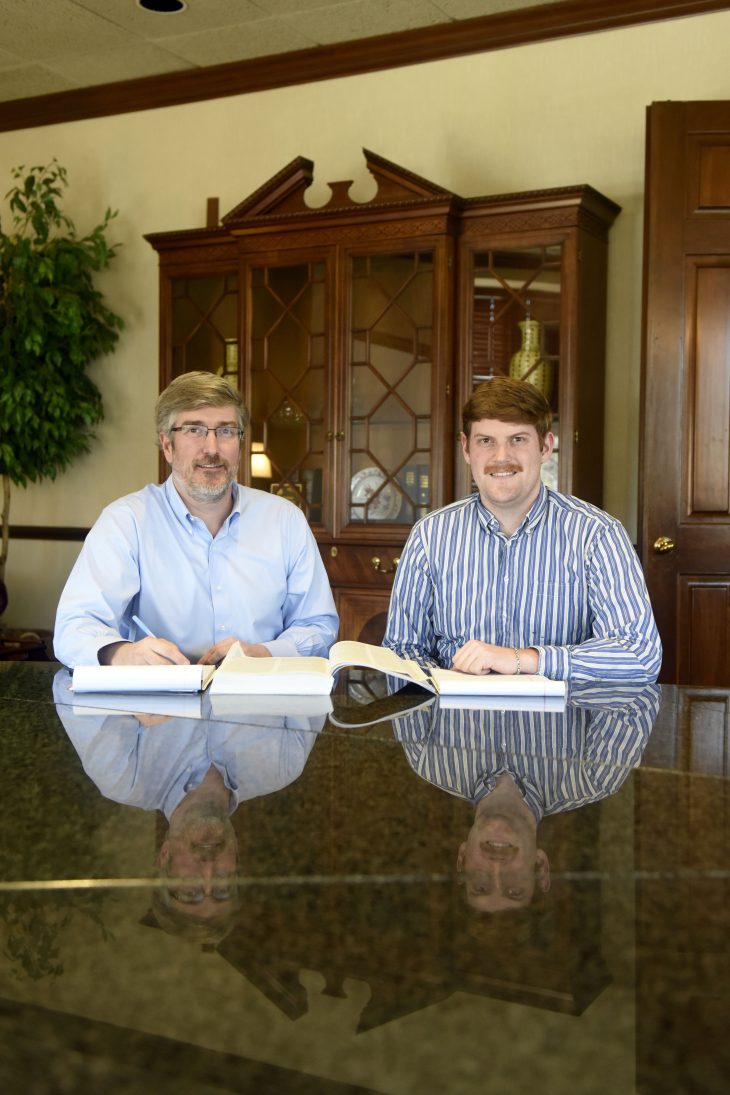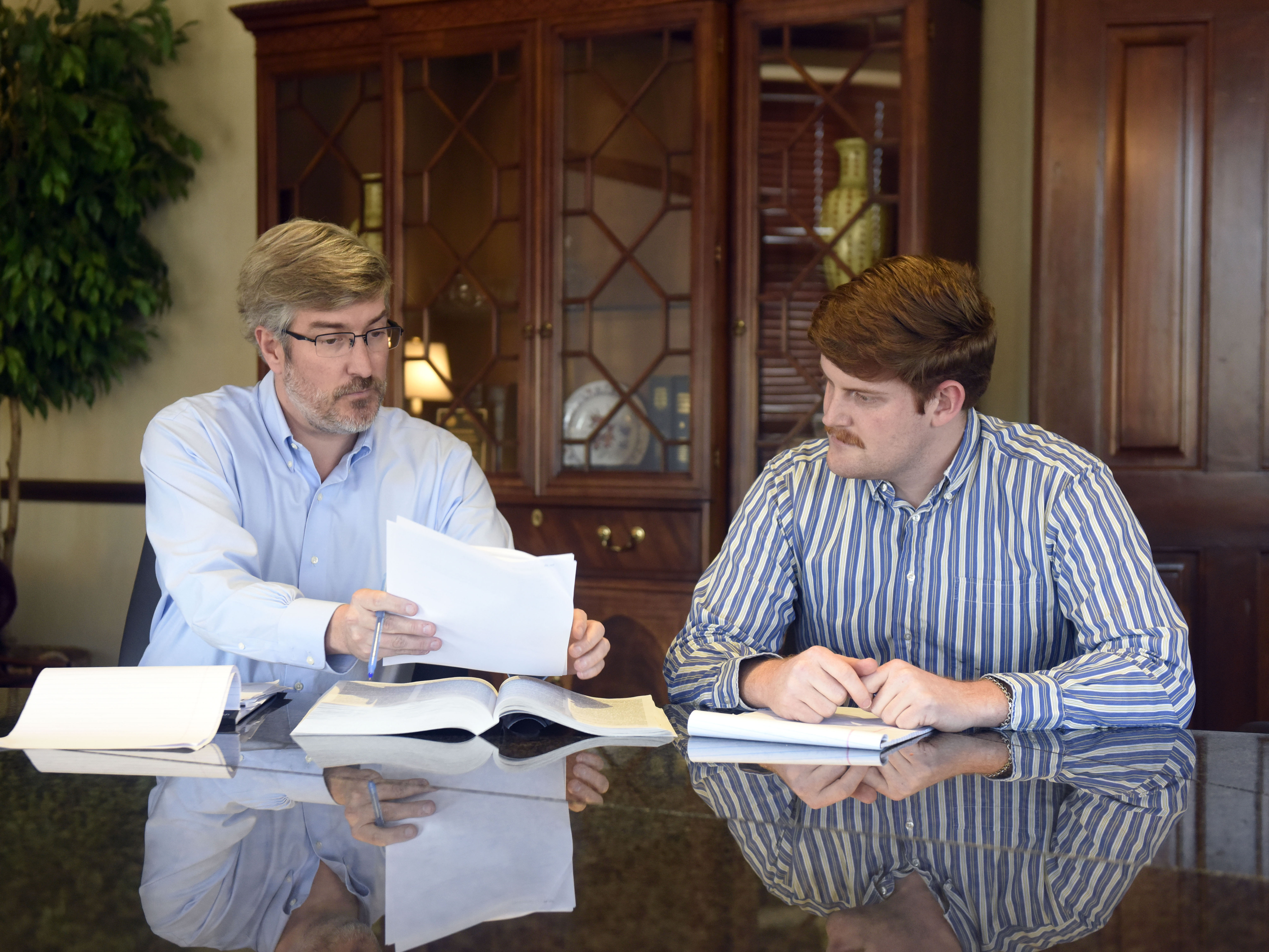Andrew Conway L’24 learned this winter at a downtown Greensboro law firm about the benefits of getting to know clients on a personal level to help address current needs and identify future opportunities.
If it wasn’t for the pandemic, Andrew Conway L’24 may not have realized as quickly that being a lawyer means more than just winning court cases.
It’s also about using legal knowledge to help others, grow and support local communities, and having opportunities to be a force for good.
Conway studied political science at North Carolina State University before graduating in 2020 at the onset of COVID-19. A jittery job market led to work as an office assistant for a personal injury law firm in eastern North Carolina.
When the world started to reopen, Conway began applying to law schools, and he would soon call Greensboro home for the next two-and-half years at Elon University School of Law.
The native of Greenville, North Carolina, recently answered questions about his path to law school and working under the guidance of attorney Robert Young during his Elon Law winter residency at Carruthers & Roth, P.A., a law firm in Greensboro specializing in business law, banking and finance, construction, and estate planning, among other practice areas.
This is the third and final profile in a series of conversations with Elon Law students in the Class of 2024 completing their residencies-in-practice in recent months.
***
Share how you were inspired to pursue a career in the law, and how did you first learn about Elon Law?
When I graduated from NC State during the pandemic, jobs were scarce. I applied to numerous law firms because they were hiring. Eventually, I was hired as an office assistant at a personal injury law firm in my hometown in Greenville, North Carolina. Prior to working at a law firm, I had no direction on what my career would be. My experience helped me realize that the law was my best opportunity to help my community and make a difference–something that I had always known I wanted to do with my life. Until then, I did not know that becoming an attorney would help me achieve that goal.
After about two years of work for the firm, I applied to Elon University as one of my in-state options, and happily, I got accepted! My coursework and experience outside of the classroom has only furthered my interest in serving the community.
How did you identify your residency as an option?
Following my first year of law school, Elon provided a list of residencies where I could potentially be matched. The list was divided into practice areas and I knew I had an interest in litigation. Carruthers & Roth came on my radar as one of the best firms in Greensboro as I researched firms. I made it my top choice.
Describe your daily responsibilities at the office.
I was treated just like any other first-year associate at the firm. My residency supervisor and partner at Carruthers & Roth, Robert Young, told me this when I started. My daily responsibilities included drafting legal memoranda, complaints, attending client meetings, and legal research. Most of what I researched was law that could help argue a client’s case. Carruthers & Roth does various types of litigation, so my research ranged from common law negligence to statutory federal government contracting law.

Based on your experience, what’s surprised you the most about the practice of law?
Carruthers & Roth opened my eyes to just how big the “law” is. My coursework, of course, teaches me what I need to pass the bar exam, but in my opinion, the law is more than that. Sometimes the solution to a client’s problem requires non-legal analysis. Solving problems can include more than just knowing the law. Good attorneys know how to form relationships with their clients to guide them through tough circumstances and how they can improve their situation in the future without running into legal problems.
Which of your personal traits helped prepare you for the responsibilities and professional opportunities you’ve discovered in this area of law?
Personability has been the trait I consider the most useful when dealing with areas of law that require one-on-one interaction with clients. No matter your client, you must understand them personally and thoroughly to truly understand how to advise them. From the individual criminal defendant to the massive international corporation, attorneys have a great amount of influence over how people make decisions. If an attorney wants to live up to the name of “counselor,” then having a solid relationship with the client is paramount.
In what ways, if any, has your residency experience shaped your plans for after graduation?
My residency gave me the opportunity to “try out” what I thought I wanted to do post-graduation. For many people, it is an opportunity to decide that they do like the area of law or make them realize that they want to try something different after graduation. Residency experience is invaluable to starting off on the right foot as an attorney after passing the bar exam.
Share one “quick tip” for current and prospective students as they prepare for their own Elon Law residencies or, more broadly, law school in general.
Law school can be physically, mentally, and emotionally draining, especially during your 1L year. To succeed in law school, you must fully commit to the experience. Keep the end goal of becoming an attorney in sight and know why you want to become an attorney. Having something to look forward to at the end of the process can keep you grounded when traversing through the sometimes rocky landscape of law school.
To succeed in law school, you must fully commit to the experience. Keep the end goal of becoming an attorney in sight and know why you want to become an attorney.
– Andrew Conway L’24
About the Residency-in-Practice Program
Elon Law’s highly experiential 2.5-year curriculum requires every student to complete a full-time, course-connected residency-in-practice during their second year of study. Through faculty-directed residencies, students cultivate essential skills, values and judgment to help them excel as attorneys and deepen their understanding of various practice areas, while enabling attorneys to convey wisdom about the legal profession.
Students work 32-36 hours a week over a 10-week trimester with a judge or attorney supervisor and a faculty member to create and implement a learning plan that develops an increased proficiency in professional legal skills and in an area of law practice.



